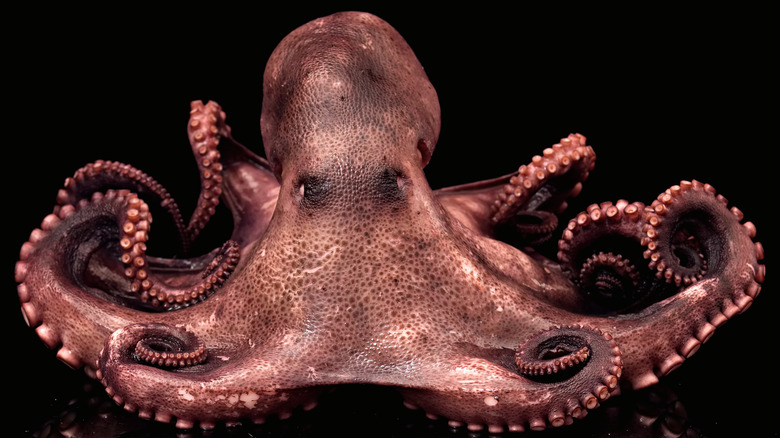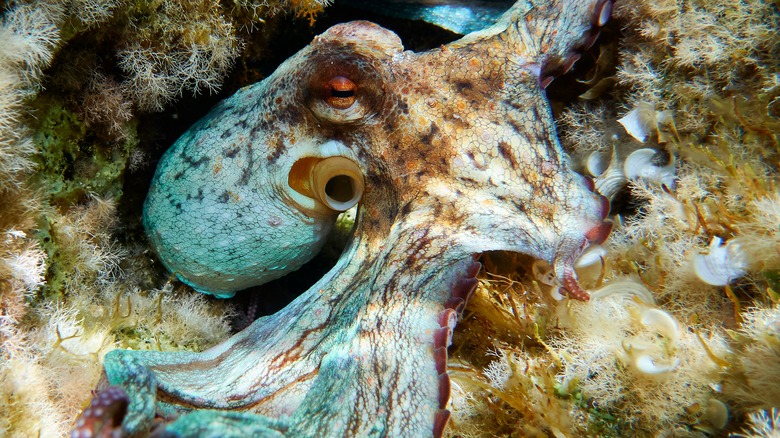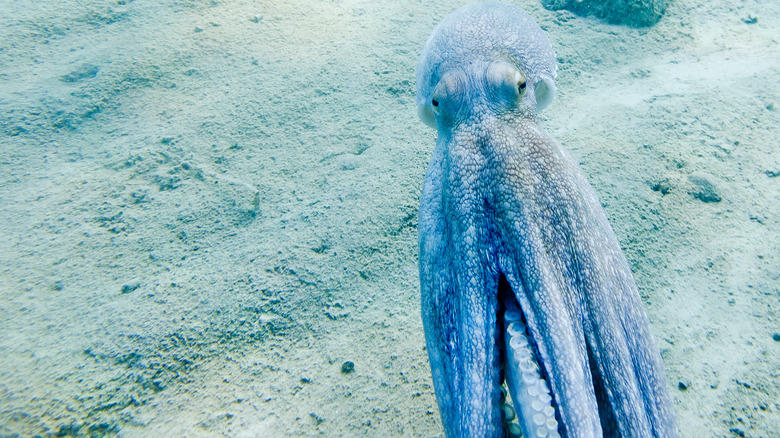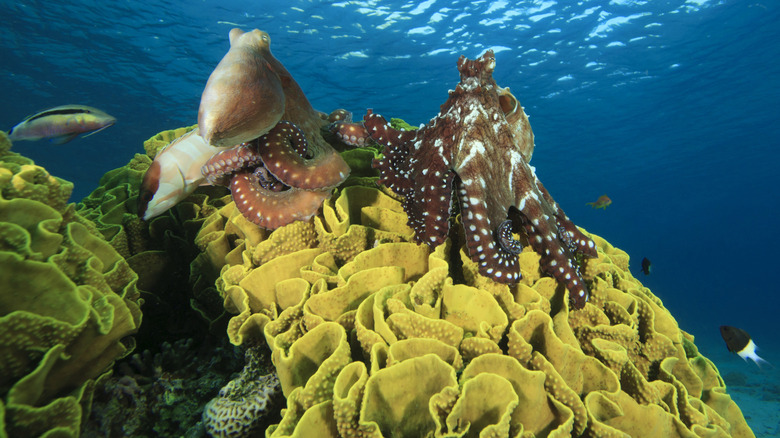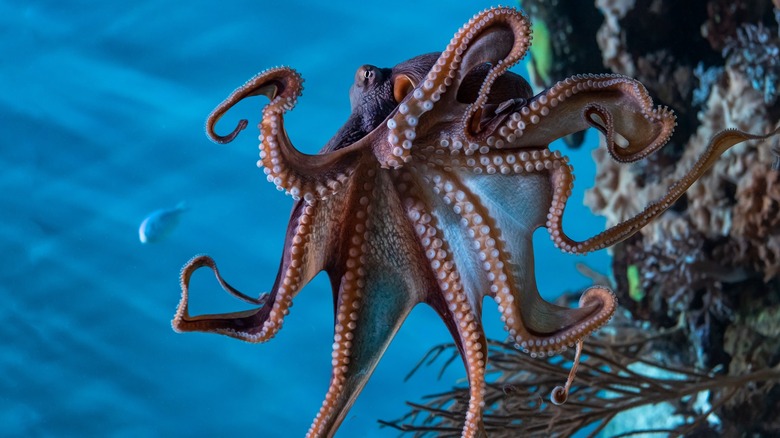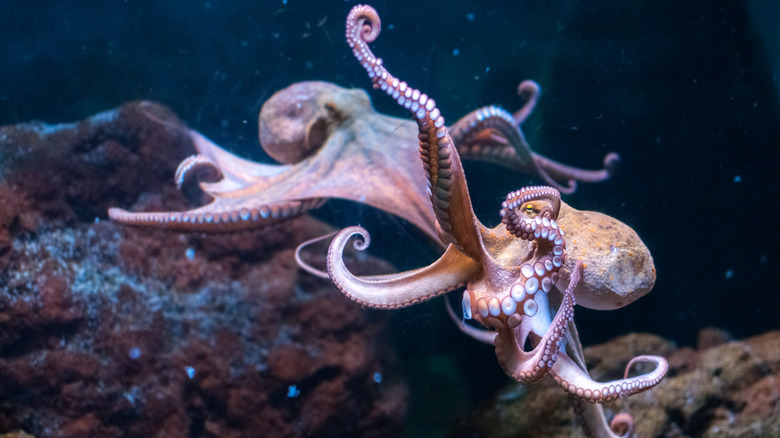The Murky Details Of Octlantis, A City Built And Run By Octopuses
Regardless of where you reside, city life is something most people can picture. Characterized by looming skyscrapers, streetside cafes, and bumper-to-bumper traffic jams, cities are a huge part of modern culture. They serve as backdrops in movies, sure, but in real life, their purpose is larger still. According to the World Bank, cities house approximately 56% of the global population and are highly regarded as centers of trade, commerce, and innovation.
When you close your eyes and picture a city, you're probably imagining narrow streets and busy intersections, corporate employees standing in subways, and the smell of local street food wafting through the air. But what do you think a city would look like if it was built and run by a different species — say, for example, octopuses? Yes, octopuses: those clever, tentacle-clad sea creatures with massive roving eyes and bulbous heads.
Oddly enough, you don't have to imagine that. One such city does already exist beyond the realm of imagination, and according to Science Alert, it bares a somewhat haunting resemblance to cities built and run by humans. Here's a deep dive into the fully submerged, octopus-inhabited metropolis.
Discovering Octlantis, the octopus city in Australia's Jervis Bay
According to Live Science, octopuses have long been regarded as solitary creatures; lone rangers of the deep blue scurrying across the ocean floor, their long, extended arms circling around them like deadly, billowing gowns. But lately, scientists have been observing startling incidents of octopuses getting together to engage in erratic, human-like behaviors, like the time nearly two dozen cephalopods simultaneously crawled right out of the ocean and started walking around on dry land (via Science Alert) — just one of the terrifying things you didn't know octopuses could do.
Perhaps it didn't take long for the sea creatures who sport a brain on each of their eight arms to figure out that there's power in numbers (per the Natural History Museum). Whatever the reason, Science Alert reported in 2018 that scientists had discovered a large group of octopus dens constructed within close proximity to one another some 33-49 feet beneath the surface of Jervis Bay, an oceanic destination located off the coast of Eastern Australia. According to Visit NSW, Jervis Bay is known for its white sandy beaches and bottlenose dolphins, but it is also now recognized as home to Octlantis, one of two recently discovered octopus cities. You read that right. There are two known octopus cities, and both of them exist in Jervis Bay.
Introducing Octopolis, another city of octopuses
In case you were thinking this octopus city was some kind of fluke, an anomaly too murky to understand, think again. That was the conclusion scientists initially drew back in 2009, when they discovered Octopolis, yet another city built and run by octopuses and situated in Australia's Jervis Bay. According to Newsweek, the settlement was being studied extensively by researchers Peter Godfrey-Smith, Matthew Lawrence, and David Scheel, to name a few.
Per Science Alert and Newsweek, both submerged cities are inhabited by the Sydney octopus, alternatively referred to as the gloomy octopus, who sports a rustic red appearance and loves to spend time on the rocky shores, according to the Australian Museum. Defying all the previous research that denotes the octopus as a solo sea creature, Octopolis not only exists but also continues to expand. As more octopus dens are constructed in the region, the cramped living quarters create an atmosphere that's a lot like any land-based city. Creatures here are fighting to carve out spaces in the underwater society, and those fights sometimes turn to blows.
Octopuses are spotted interacting in this city setting
The mean streets of Octlantis may be 49 feet beneath the ocean's surface, but the octopuses that live there are still making waves. According to Science Alert, researchers have seen the cephalopods gather for group meetings, congregate in a central location, and communicate with one another using the colors of their camouflaged coats.
The team of researchers now has hours of video footage showing these submerged cities where octopuses rule, and their behaviors might not be what you'd expect. Newsweek reports that one study published by Current Biology described the octopuses in Octopolis gathering around a slightly raised section of the city and standing on the platform to display themselves in various hues. They would spread their legs and raise their bodies while another octopus looked on.
Before you start thinking the cephalopods are big theater buffs putting on spectacular light shows, you should know that this show is a kind of confrontation that sometimes gives way to a fight. There have reportedly been hundreds of these types of interactions since the city was discovered and a fraction of those have led to sparring, wrestling, and the likes, with the losing octopus retreating at the end.
Even tenants with tentacles get evicted
A lot of unexpected, city-like behavior has been observed since cameras were set up around Octlantis. One of the strangest of these is the concept of octopus eviction. According to Science Alert, the gloomy octopus community is a pretty tight-knit crew of neighbors. From time to time, they have been known to band together and chase unwanted octopuses out of town. Peter Godfrey-Smith hypothesized that these cities might serve as sanctuaries, a place where the octopus can come and go and defend itself against deadly predators like seals and sharks (via The Guardian).
But being a community resident is not necessarily a pass for safety. There have been reported incidents where octopus residents were straight up evicted from their dens and forced to leave the safety of those walls constructed of shells. There's no official word on the social dynamic of such behavior, but one thing is certain: when you get evicted as an octopus, it probably sucks.
Rethinking the way we see the sea
With so much time and energy spent exploring the sea of stars above us, very little is known about the sea of life beneath us that exists off our sand-filled beaches and crystal coastlines. Perhaps the existence of octopus cities will serve as a way of recapturing our collective attention (via Science Alert). For, even if we're not that fascinated by octopus infrastructure — or the fact that they exhibit such high levels of social and emotional intelligence that they're capable of building and sustaining cities — there are broader implications in this discovery.
In an interview with Quartz, Alaska Pacific University Professor David Scheel explained, "These behaviors are the product of natural selection, and may be remarkably similar to vertebrate complex social behavior. This suggests that when the right conditions occur, evolution may produce very similar outcomes in diverse groups of organisms."
Given our current state of affairs, it would not be at all surprising if even more sea creatures began building cities out of abandoned artifacts and shells, giving a whole new meaning to the term "sunken city" while at the same time adding to the list of underwater cities found in mysterious places.
